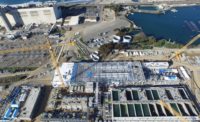IDE Technologies Ltd., a leader in the global desalination technology market that is owned by two Israeli firms, is set for spinoff next year from its Israel-based corporate owners to boost the have decided to put the company on the block.
“There are only a few companies out there that have experience in the field of large desalination plants and this could make IDE very attractive to a major international infrastructure company,” says Chen Herzog, chief economist and energy and infrastructure expert in the Tel Aviv office of BDO Consulting.
In order to make IDE more attractive, its current owners are considering the sale of the company’s 50% stake in three Israeli desalination projects at Ashkelon, Hadera and Sorek, which are among the world's largest seawater reverse osmosis facilities.
In the past year France’s Veolia Environment and Israel’s Azrieli Group sold their interests in local desalination plants at Ashkelon and Palmachim to foreign and local equity funds.
Israel Chemicals and Delek Group have each decided to focus on their core businesses, fertilizers and industrial chemicals for the former and oil and gas exploration for the later.
For IDE the sale could help the company expand more rapidly abroad at a time when the prospects of growth in Israel have waned.
In recent years IDE has built the large desalination plants in China, India, Chile and Australia.
Last year the company won the tender to build the largest desalination plant in North America at Carlsbad, Calif. But the largest potential market for desalination plants remains the Arab world which is currently off limits for the Israeli based company. “The global desalination market has been on a downturn but the Arab world in countries like Saudi Arabia, Qatar, Kuwait, Oman and the UAE still have a healthy pipeline of projects coming up,” says Tom Scotney, deputy editor at Global Water Intelligence, a leading water industry publication that focuses on desalination.
He adds that the best fit for IDE would be someone like Japan’s Mitsui “which has the financial clout, global reach as well as an established engineering base in the Middle East.”
But he cautions that even if sold to a foreign company like Mitsui it might still take up to five years or more before IDE sees any business in the region.
The move comes as Israel’s domestic desalination market is taking a breather after construction over the past decade of five large plants along the country’s Mediterranean coast. Total capacity is slated to reach 600 million cu meters annually when the fifth plant at Ashdod is completed next year.
“The existing plants are expected to meet demand for the coming years including commitments to the Palestinians and Jordan,” said Avraham Tenne, director of desalination at Israel’s Water Authority.
With few prospects in Israel these days, IDE announced in October that it was laying off 50 out of its 450 local employees. The company added that it would now focus its efforts on the international desalination market.
Israeli analysts are predicting that a sale of IDE is likely in 2015 and could fetch as much as $1 billion. IDE reported net profit of $7 million on revenue of $112 million in the first half of 2014.
“There are only a few companies out there that have experience in the field of large desalination plants and this could make IDE very attractive to a major international infrastructure company,” says Chen Herzog, chief economist and energy and infrastructure expert in the Tel Aviv office of BDO Consulting.
In order to make IDE more attractive, its current owners are considering the sale of the company’s 50% stake in three Israeli desalination projects at Ashkelon, Hadera and Sorek, which are among the world's largest seawater reverse osmosis facilities.
In the past year France’s Veolia Environment and Israel’s Azrieli Group sold their interests in local desalination plants at Ashkelon and Palmachim to foreign and local equity funds.
Israeli water industry sources say that IDE will likely follow the same route, as desalination plants are no longer viewed as a risky investment and provide a healthy return for institutional investors.


Post a comment to this article
Report Abusive Comment